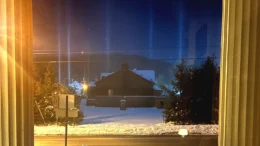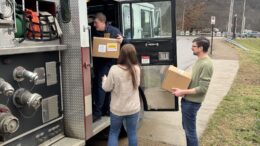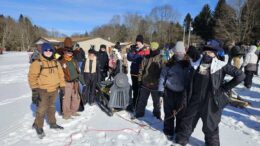Pennsylvania has declared this week to be Conservation District Week in the state.
The week, which is observed every year, “celebrates and highlights conservation districts’ stewardship of the Commonwealth’s natural resources,” according to Brenda J. Shambaugh, executive director of the Pennsylvania Association of Conservation Districts (PACD).
Districts work with landowners and local governments to help them manage and protect natural resources on private and public lands, and they are led by a board of directors comprised of “local people from all walks of life, including members of the agricultural community,” according to PACD.
Importantly, the districts do this on a local level.
“The folks in Harrisburg might not know what we want or need,” Lane said. “It’s important to understand resource needs in the local area.”
Lane said Pennsylvania state law mandates that every county have a conservation district, with the exception of Philadelphia.
“On a national level, the whole conservation district movement started with the dust bowl,” she said. “All the states eventually did their own things with conservation.”
The Venango Conservation District was founded in 1961. While it was initially “very agricultural-based,” and is still very agricultural-focused, she said the district began expanding and adding different programs over the years.
“We work with cooperators like the Venango County Planning Commission, the Department of Conservation and Natural Resources Bureau of Forestry, the Department of Environmental Protection and the state Fish and Boat Commission, to name just a few,” Lane said.
Now, the district has six staff, including Lane, administrative secretary Karen Carey, and four newly-hired technicians. They are watershed specialist Bailey Kozalla, dirt, gravel and low-volume roads technician Jake Cochran, resource conservationist Haley Bechtel and agricultural technician Jane Price.
All are involved with education of the public as well as their own specialties, she said.
“Our agricultural technician works with the agricultural community and with resource concerns on their property,” Lane said. Some of the ways the agricultural technician can help farmers includes assistance finding funding, as well as writing grants on their behalf, she said.
The watershed specialist puts together educational programs on watershed issues and is the education coordinator, Lane said, but also helps landowners with watershed issues. “Like if you say, ‘A stream is eroding my property, what do I do?’ They can help,” Lane said.
The dirt, gravel and low-volume roads technician works with county municipalities primarily to reduce pollution that comes off roads and enters waterways.
“Those are to reduce pollution by putting in practices during water construction and reducing the chance of a water pollution event,” Lane said.
Should pollution occur, the district’s resource technician can also provide technical assistance to both the entity producing the pollution and the one affected by it, she said.
Lane noted the Conservation District is also a non-regulatory agency, meaning it doesn’t issue fines.
“Let’s say we see a resource problem, and we say, ‘What do you think if we talk to you about this?’ You don’t have to be worried about a fine down the road,” Lane said. “We’re all about helping landowners with compliance before they get into trouble.”
The district can also provide local landowners with concrete, technical assistance.
“If there’s a problem, we’ll come, look at it, talk to you, and find the best way to manage it,” Lane said. “We might provide you with education, or we might find funding. And if we can’t help, at least we can get you to the agency who can.
“We’re very cooperative-minded — we are neighbors to the people we’re helping.”
The district puts on educational programs during the year, has a tree seedling sale each spring, and hosts the Venango County Envirothon for local school districts.
Staff also help Two Mile Run County Park and Venango County with monitoring the dam at Two Mile, she said.
Lane has been working with the Venango Conservation District for 20 years since 2003, first as the administrative secretary and then, starting last year, as the district manager. The district’s previous district manager, Lance Bowes, passed away unexpectedly in September.
“It has been a challenging transition for us,” Lane said of Bowes’ passing, adding that the district is “still in a transitional period.”
However, earlier this month the district announced it had hired the four new staff technicians after receiving additional state funding, and Lane said that will help the district “accelerate” its work and programming in the future.
“When I started at the district, I had never heard of the conservation district. I didn’t know it existed,” Lane said. “We’re trying to change that and get the word out, and I think this week will help with that.”



































